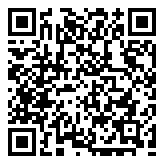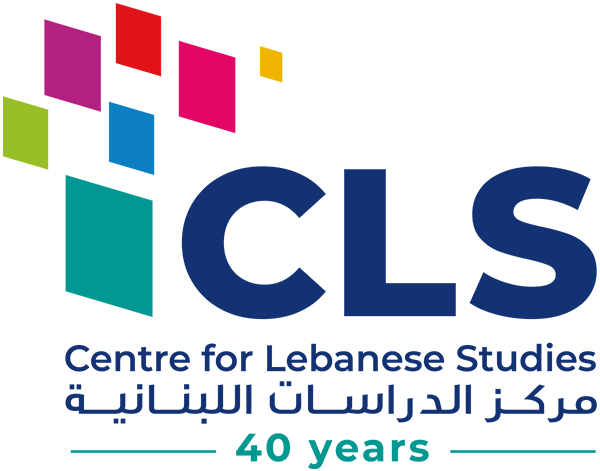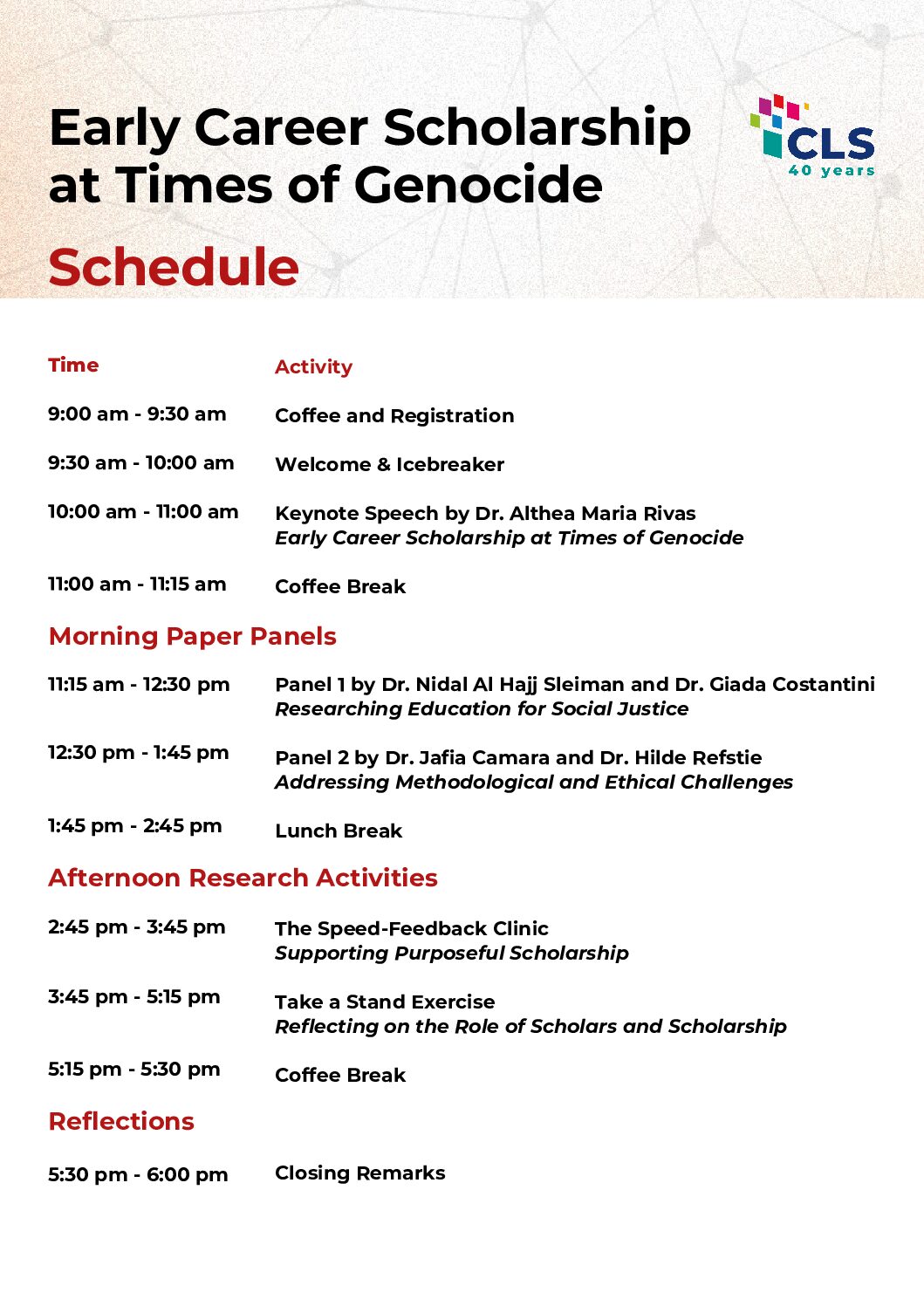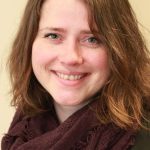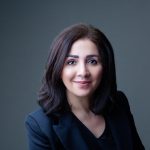
Call for Applications: Early Career Scholarship at Times of Genocide
Call for Applications: Early Career Scholarship at Times of Genocide – Deadline extended to January 20, 2025
Date: Monday, March 31, 2025
Location: University of Cambridge, UK / Hybrid
Covers: local transportation within the UK and catering during the time of the event
Open to PhD students in the UK
Event Organizer: Cyrine Saab
Keynote speaker: Dr Althea-Maria Rivas
Mentors: Dr. Hilde Refstie, Dr. Jáfia Naftali Câmara, Dr. Nidal Sleiman, Giada Costantini
Support from: Jessica Sullivan, Melissa Matar, Samah Choukri & Dr. Fawzieh Makkawi
The CLS Knowledge Collective is organising its first networking event at the University of Cambridge. The purpose of this event is to explore the challenges and possibilities of conducting research during times of genocide, particularly amongst early career scholars in the context of ongoing Israeli attacks on Palestine and Lebanon. Rather than producing humanitarian research through a top-down, Western donor-defined lens, we want to examine how scholars embedded in this region can approach their work with political engagement. What considerations should we take as early-career scholars amidst genocide? What is the role of scholarship in times of genocide, crises and censorship? What are our responsibilities and how can we produce purposeful research?
The event will feature a range of activities centered on scholarship during times of genocide. This includes paper presentations that emphasize liberatory approaches to research, particularly in the field of researching education for social justice and exploring ethical and methodological challenges. In addition, we will host research clinics where participants can present complex, difficult scenarios to mentors or receive feedback on their writing. These clinics aim to foster collaborative support, helping participants discuss challenging experiences and produce purposeful, non-mainstream scholarships. The event will conclude with an interactive session, inviting participants to ‘take a stance,’ synthesizing the day’s discussions and reflecting on the critical role of scholars and scholarship in contexts of genocide.
Throughout the event, there will be ample opportunities for networking, engaging with difficult topics, and receiving mentorship – whether in theories, epistemologies, writing, or publishing – within a supportive and engaged community committed to critical scholarship.
Application
To apply for the networking event, please send a short bio to [email protected]. Make sure to indicate the activity you want to contribute to. Accordingly, you need to share one of the following documents:
– if you wish to present your paper during one of the panels, share a 500-word abstract outlining your research and how it fits with the panel you are planning to contribute to
– if you want to present at the Three-Minute Clinic, share a 500-word text outlining a difficult scenario you wish to present to a senior academic. Make sure to indicate the theme that you want to discuss
– if you wish to present at the Speed Feedback Clinic, share a 500-word summary of your writing for which you would like to get feedback on. Make sure to indicate the theme of your research
The deadline to apply has been extended to January 20, 2025. You will be notified of the outcome of your application early in February 2025.
Cyrine Saab is a PhD candidate at the Institute of Education, University College London, with a focus on forced migration, practice-based studies and urban sociology. She is a British Academy Research Fellow at the Centre for Lebanese Studies and the University of Cambridge. Her research examines the everyday experiences of refugee children in Beirut who engage in street work, such as selling small goods or collecting recyclables, as a means of forging their livelihoods. This phenomenon has grown in the aftermath of the Syrian refugee crisis in 2011, alongside Lebanon’s more recent overlapping crises. Using ethnographic methods, Cyrine explores how these children reduce the risks tied to their work and improve their income generation.
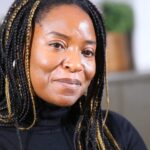 Keynote Speaker: Dr Althea-Maria Rivas
Keynote Speaker: Dr Althea-Maria Rivas
Dr Althea-Maria Rivas (SOAS), is a Senior Lecturer in the Department of Development Studies at SOAS. Her research focuses on the politics of development, conflict, humanitarian intervention and peace, specifically the racialised and gendered nature of aid, post-conflict reconstruction and transitional justice. Before beginning her academic career, Althea worked for +12 years in diplomacy, gender equality and humanitarian assistance with various governments, local and international organisations in North America, Africa, Asia, the Caribbean and the Middle East. Her research draws upon critical, Black feminist and decolonial theoretical frameworks to explore debates in the field of conflict, security and development. She uses a variety of methods in her work including innovative grounded methodologies, photovoice, storying and narratives.
Mentors:
Hilde Refstie is Associate Professor of Geography at the Norwegian University of Science and Technology (NTNU). Her research focuses on humanitarian and disaster response, forced migration, and urban inequalities. She works with participatory action research in an effort to learn from grassroot organisations and connect research and practice. She leads NTNU’s MSc program in Globalisation and Sustainable Development with experience in international research and education collaborations. Her previous roles include work with the Refugee Law Project in Uganda, Cities Alliance in Washington, DC, and the Norwegian Refugee Council in Oslo. She is also part of the NTNU-SINTEF Gemini Center Equitable Partnerships for Global Impact.
Jáfia Naftali Câmara is a Brazilian scholar and educator. She holds a PhD in Education from the University of Bristol with a thesis titled “Refugee youth and education: aspirations and obstacles in England” and an MA in Teaching English to Speakers of Other Languages from the New York University.
Câmara is currently a British Academy fellow at the Centre for Lebanese Studies and the University of Cambridge. She was a Research Assistant at the University of Bristol and ActionAid.
Her work uses an antiracist and anticolonial approach to young refugees’ education, and explores how refugee learners, families and teachers can co-develop refugee-led research and engage critically with ethical challenges encountered during research. She has received multiple awards and grants, including the Volunteer of the Year Award from Jacari and the Bristol PLUS Award. She has published in both academic and non-academic publications including The Guardian, openDemocracy, and the Max Planck Institute.
Giada Costantini is a recent PhD graduate and Teaching and Research Associate at the University of Birmingham. Her research focuses on education in humanitarian contexts at the intersection of disability and refugeehood, adopting an intersectional and interdisciplinary lens. She currently teaches on the Master course ‘Education as an International Issues’, and she is involved as a volunteer tutor in the Open Learning Initiative (OLIve), where she provides online tutoring for students from refugee backgrounds. She worked with the Foreign Commonwealth Development Office (FCDO), the United Nation Global Fund for Education in Emergencies (ECW) and the Inter-agency Network for Education in Emergency (INEE).
Dr. Nidal Al Haj Sleiman is a British Academy Research Fellow at Ulster University and a sociologist of educational leadership and international education. Nidal has a PhD from UCL’s Faculty of Education and Society, Department of Learning and Leadership. Nidal’s current research examines critical education and educational leadership for social and cultural justice and peacebuilding in conflict-affected areas. Her doctoral research focused on the sociology of educational leadership and learning in multicultural international schools. Nidal worked as a teacher and a principal in Lebanon and Qatar for many years before starting her research journey and has contributed to several educational professional and academic initiatives in Lebanon, Qatar, Iraq and England. She is also co-founder of the SWANA Forum for Social Justice, a platform that focuses on education and social justice in the SWANA region. Her publications generally focus on educational leadership praxis and education policy in pluralistic contexts and the sociology and political economy of education in the Middle East.
